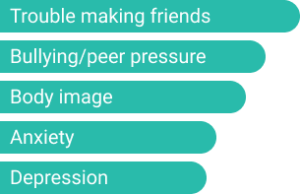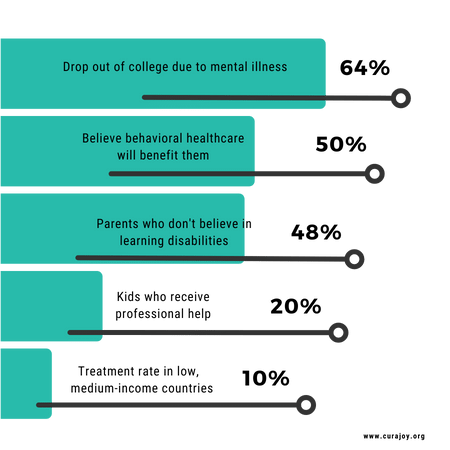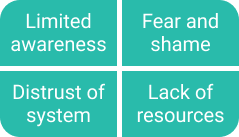When curaJOY first started and began designing our program to improve all family members’ emotional wellness, we expected to mostly hear from parents concerned about their kids’ emotional wellness and social-emotional development. But it was youths—tweens and teens around the world who sought us out, asking for help to become happier and make more friends.


kids surveyed wished their parents cared more about their emotional well-being
What’s worse, 33 percent of educators say that sometimes what people call a learning disability is actually laziness, downplaying the very real stress and burnout people with learning disabilities experience. Because of this, teens are discouraged from seeking out help, believing that they’ll be seen as lazy if they try, or that they are just overreacting to the problems they face.
Over half of the people curaJOY surveyed believe they would benefit from counseling, coaching or other types of behavioral health support. The world is facing an unprecedented shortage of behavioral health professionals (therapists, psychologists). This shortage contributes to the low number of people receiving behavioral healthcare, but another issue is not seeking help. Our youth suffer in silence. Why?
In fall 2022, curaJOY interviewed more than 1,700 families in the United States and East Asia. Thousands of kids shared their struggles with bullying, peer pressure, friendships, and more. Over 50% of kids surveyed believe they would benefit from counseling or other types of support but cited parents’ attitudes as the main barriers to getting help.
Even perfectly typical kids without mental conditions are not immune to anxiety, burnout, or pressure. Many teens feel insecure about themselves for various reasons, from body image to academic success and social media life. Rigorous school life and exaggerated social media posts combined with pressures at home can make even the most cheerful teen feel as though they have nowhere to turn to—as though they are not good enough and never will be. So many teens feel this way to the point where suicide is the fourth leading cause of death in teenagers aged 15-19.


Although technology has dramatically pioneered ways to fight diseases and make life more comfortable, mental health has been mostly left in the dark. To most people, what’s going externally (i.e., physical health and education) are the only things needed to live a happy, successful life. But they don’t realize that youth mental health programs plays a significant role in health and learning. The brain controls the body. If the brain is stressed out and needs help, the body will become stressed. Health declines, and students struggle to learn. Over 50% of kids with emotional, behavioral, and mental health disorders drop out of school. It’s not because they’re immature or simple-minded, but because they didn’t get the mental health care they need and are dealing with stress in unhealthy ways.


More than 52% of LGBTQ suffer from poor mental health of teenagers. This affects their physical wellbeing and educational outcomes.

According to the latest CDC research, more than 1 in 3 teenagers have seriously considered suicide. Adult stress during COVID seeped down to children who do not deserve yelling, put-downs, neglect, and beatings.

Teenage girls are emotionally distressed at a historic high, twice as much as teen boys. 1 in 5 experienced sexual violence just in the last year.
curaJOY creates a one-stop behavioral support program, MyCuraJOY, to serve as a safety net for youth who could otherwise only depend on their caretakers to recognize and accept their distress.
Is cyberbullying the same as it used to be? For Gen Z and Gen Alpha, growing up online means they’re navigating a world where a single emoji, a vague post, or even a “like” can carry more meaning than they appear to have. It’s no longer just about mean messages or public shaming. Today, subtle
To my daughters, on your 17th birthday— I knew time would fly, but I didn’t expect it to hit like this. You’re on the edge of adulthood now, close to leaving home, and I’m supposed to be preparing you to fly. But I’m the one who’s unsteady today. Because when I look at you, I
As artificial intelligence (AI) continues to transform industries, the importance of cybersecurity has evolved from a reactive necessity to a proactive strategy. In sectors like mental health, education, and wellness, where sensitive data and vulnerable user groups are involved, AI security is not just a technical requirement, it’s an ethical one. At curaJOY, where we
A few days ago was my first day at the AI-GSU show. The experience was….different than I was expecting to say the least. The building was bigger and was less packed with people than I thought it would be. There was a machine making cotton candy for free, along with some people giving out coffee.
Across the country, more and more people are struggling to maintain consistent housing and the mental health support they desperately need. Rates of homelessness and mental illness have risen over the past few years, creating challenges that ripple through every community. Even if you or someone you know hasn’t been directly affected, these issues touch…
According to WHO (World Health Organization), burnout is defined as “a syndrome conceptualized as resulting from chronic workplace stress that has not been successfully managed. It is characterized by three dimensions: No matter if the burnout episode lasts a day or an entire month, it can be safe to say that burnout feels terrible. From